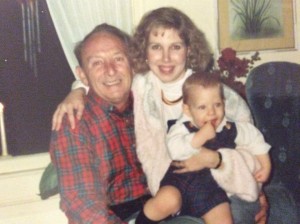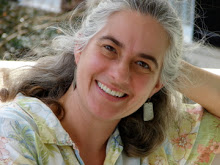The Body: Birth and Death, Two Stories
When my uncle Luther Taylor was taken to hospice three weeks ago, he said on arrival to a nurse, “How long is this going to take?” He was an adventurous and matter-of-fact man, also sick and ready to go.
At his grave yesterday, on a warm and beautiful February afternoon, his daughter, Methodist minister Tuck Taylor-Loveland, recounted a moment with him when she was a small child and first grasped the fact of death. She was upset at this news and climbed up into his lap, said, “I don’t want to die. I don’t want you to die.”
He, a religious man, said: Well, most people, if you asked them whether they wanted to be born or not, would probably say, No, I’ll just stay here where I am. But think of all we’d miss if we weren’t born. Death is like that, he said.
Sitting at his bedside a few weeks ago, Tuck felt another connection between the processes of birth and dying. This is what she wrote then (and which you may have seen on my Facebook page– I do treasure it):
I’m sitting by my father, listening to him breathe while he sleeps so deeply. He is at that stage of the death process that his breathing is erratic. Long pauses between breaths catch my attention- now? Is the time now? No, he takes another breath. I relax. Sort of. The pauses are increasing in frequency and duration. This feeling is familiar. It feels like waiting for contractions when I was in those last days of pregnancy.
Waiting for death is a lot like waiting for birth. The first time I realized this was 11 years ago, sitting by mother as she journeyed toward death. It was just 2 years after my last son had been born, and so, not far below my emotional surface, were the feelings of anxious anticipation, of knowing life was getting ready to change in a drastic way, of monitoring every physical change, of knowing the time was nearing and knowing, too, that I had little to no control over the timing of this life force. I was surprised, and a little disturbed, to feel so intensely these same feelings (but with sadness) as I sat by mother’s side, reading her her favorite scriptures and inspirational writings.
And now I sit again, waiting for death, aware once again of the impending change that will happen very soon in my life, and thinking again of the weeks and days before my children’s births. It’s an odd phenomenon. Waiting for death, remembering birth, similar feelings, yet located on polar ends of the emotional spectrum. And yet why shouldn’t these experiences be similar to one another? It is a time of great life transition and intense emotion. The journey toward both is holy, and challenging. The essence of the God of Life, the alpha and omega, is present and revealed. New life, second chances, grace, mercy, resurrection, hope, peace, joy. Love. New life is coming. But this time, as with my mother, my heart is breaking.

And a second story — of birth of the body. In my last post, I mentioned a book-in-progress by Diane Brandon on people reporting memories of their own birth. In response to that, I received an email from writer Beth Browne, she has given permission for me to share. It seems she may have been one of those that Uncle Luther described as being hesitant about entering this world.
As a very young child, I had a recurring nightmare. I wasn’t old enough to be able to think ahead to dread it, although I always woke from it gulping for air. Because I was so young, the dream is difficult to describe, but I know this: It always started out exceedingly pleasant. I had a sensation of smoothness that seemed like white, only not blinding, just pure, easy and content. I felt blissful. It was so good, a feeling of total comfort and ease.
Then, without warning, something changed. There was a tremor in the vast happy whiteness, just the slightest shift, barely noticeable. Then back to the easy contentment. When it came again, the creases lasted a little longer, were a little more noticeable. It was as if some decay was occurring in my surroundings. What was smooth and clean became brown, ugly, crinkled. I hated it. I wanted it to stop, but it came more often, for longer periods, inexorably increasing. There was no pain, but it was terrible. I couldn’t stop it.
Faster and faster, the periods of horror increased in length and frequency until finally, the pleasant part was gone entirely and I woke up panting. Once I was awake, the feeling of terror subsided slowly as I realized the dream was over. I must have had the dream many times, because I remembered it into adulthood, although I can’t remember the last time I had it.
I don’t remember who first asked me if I remembered my birth, but the question somehow brought up the dream and my adult self suddenly realized that the dream must have been a memory of birth. I don’t know what the uterus would look or feel like from the inside, or whether it wrinkles during contractions. I can’t explain the sensation of brown-ness, but that is definitely a clear part of it.I wonder if death will be a reversal of this process, the discomfort of dying slowly giving way to a peaceful ease.
Thank you, Beth Browne, Tuck Taylor-Loveland, and Luther Eddice Taylor, who always loved to fly, his hot air balloons and the plane he built himself.
Categories: Uncategorized
Tags: alpha and omega, Beth Browne, birth, birth and death, blissful, breath, breathe, breathing, contractions, death, death process, heart, hospice, intense emotion, life force, life transition, Luther Taylor, Methodist, minister, my birth, new life, physical change, pregnancy, recurring nightmare, resurrection, timing, total comfort, Tuck Taylor-Loveland, waiting





Comments
Wonderful memories and alovely ways to describe both birth and death.
Thanks, kenju. Both Tuck and her brother Trey told dozens of wonderful stories. I wanted to quote them on and on.
Powerfully lovely. And thinking of you.
Thank you, Kelley!
I’ve heard similar dream-memories from clients over these many years, and I thought them linked to birth-memories. In my own therapy, I had several body-memories, where I felt as if the sensations in my body were “memories” of going through the birth canal, and then later, being “outside” for the first time.
Strong stuff, Joe, and validating. To other readers: Do go to Joe Burgo’s wonderful blog, After Psychotherapy; you’ll likely be hooked.
Thank you, Peggy! I’m honored to be included here. I just love Tuck’s story and her name!! I hope your uncle experienced a smooth transition. My condolences on your loss.
I do appreciate your letting me use this story, Beth.
Thank you, Beth, for this story. Your dream is exactly how I hope my dad’s transition was – that any moments of terror and anxiety were quickly replaced with peace and new life.
Don’t know how to footnote this – however, I have read (perhaps in POETRY magazine or The Sun magazine) words used to the effect of dying out of a prior world into this life (for me, 1944) and likewise of being born into the next, reversing the usual vocabulary so that death begins this life and birth is the end of this and into the next (or eternal).
An interesting idea, and will be about as hard a sell as switching to the metric system.
This was very moving, Peggy. I love your uncle’s answer to Tuck as a child. I have often thought or imagined or hoped that death would be similar to the feeling of entering the water, transitioning into a different element in which we are weightless, but still ourselves. It never occured to me until this moment that I was describing the experience of being in utero. I don’t have any sense of remembering my own birth (although when I was a child I HATED pulling T-shirts on over my extra-large head), but maybe I do have some memory of floating in the womb!
I love the idea of entering the water, Christina. I tend to favor water images for just about everything.
Thanks for continuing this discussion, Peggy! I can definitely relate to what your uncle shared about whether people would want to be here, if asked. One of the things I remember thinking and feeling when I was born was that I definitely did not want to be here again, but knew that I had to be. Among the people I’ve interviewed thus far (whose accounts are featured) for my book, “Born Aware — Memories of Those Spiritually Aware Since Birth,” many welcomed incarnating and some didn’t. I may have felt the most resistant. I do feel that some people may carry an unconscious memory of their birth that may be expressed in dreams or triggered via external events, although those of us who have always consciously remembered that time or pre-birth may be the exception. At the same time, I feel that many people have had full awareness at birth, but an amnesia of sorts sets in.
I don’t know that I’d want to remember my birth, Diane. Sounds like a pretty rough experience. Are you glad that you have these memories?
I don’t remember the actual birth process itself, Peggy. I don’t think I cane “in” (i.e., my consciousness didn’t enter the body) until I emerged from the birth canal. I’ve always remembered what I thought when I was born, meaning right after the birth. Yes, I’m very glad that I have these memories because I’ve always been spiritually aware. (I’ve always had somewhat of a memory of being with God prior to birth and of having had absolute knowledge, as well as that I had to be here to do something.) Everything has its advantages and disadvantages, but I wouldn’t want to live my life without the spiritual awareness I have. This is a simplistic answer to your question, but in my book I’m delving into this material in a lot more depth. Just the correlations among the people I’ve interviewed who are similarly afflicted alone has yielded some wonderful insights and information.
Probably just as well you skipped the delivery part, Diane. Can you say more about your pre-birth memories, what that was like? I’m fascinated.
My pre-birth memories are vague, Peggy — primarily a sense of being on higher levels where there’s a sense of wonderful light and security, as well as being with God, which is powerful and which words can’t describe well. (although Eben Alexander’s description of being with God in “Proof of Heaven” has come the closest to what I remember). I’ve always carried that sense of a direct connection to God, which is hard to describe in words, but it’s been powerfully protective and almost a source of both security and insight. While writing the book, I realized that, because I was so strongly resistant to being here, I haven’t been allowed to remember higher levels more clearly because it would just be even more difficult to be here.
Some of the people in the book have some clearer memories that are pre-birth — and they tended to welcome coming here. Among the people I’ve interviewed thus far the experiences are quite varied, although not in conflict. It’s fascinating material!
I look forward to reading your book, Diane.
Thanks, Peggy!